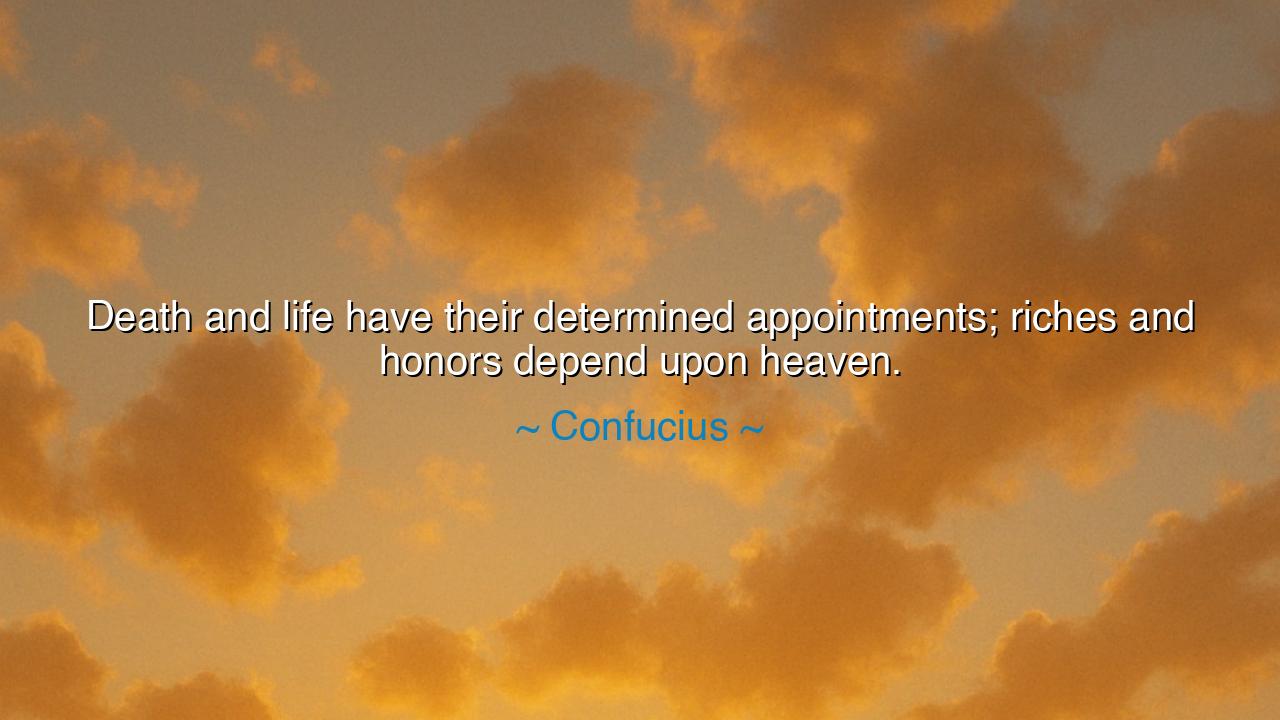
Death and life have their determined appointments; riches and
Death and life have their determined appointments; riches and honors depend upon heaven.






“Death and life have their determined appointments; riches and honors depend upon heaven.” Thus taught the wise Confucius, the Master of the East, whose words have guided emperors and peasants alike for over two millennia. In this saying lies the calm heartbeat of his philosophy—the recognition that fate governs the bounds of existence, yet virtue governs the worth of the soul. It is a reminder that human power is limited, that our days are measured by forces greater than ambition, and that all things—our life, our death, our riches, and our honors—flow from the will of Heaven, the eternal order that rules over the seen and unseen realms alike.
In the world of Confucius, “Heaven” was not merely a place but a principle—Tian, the divine harmony that sustains all creation. To live rightly was to live in accordance with this harmony, to act with righteousness and humility, accepting what was given and surrendering what was taken away. When the Master spoke of “determined appointments,” he did not counsel passivity or despair; rather, he urged acceptance of destiny with dignity. Life and death are not punishments or rewards; they are appointments—moments chosen by Heaven that every mortal must meet in their season. To fight them with bitterness is to war against the rhythm of the universe. To accept them with peace is to walk in wisdom.
Throughout the ages, this truth has been written in the lives of the great. Consider the story of Guan Yu, the legendary general of ancient China, whose valor and loyalty made him a symbol of righteousness. He served his lord with unyielding faith, but even he could not escape his appointed death, captured and executed by his enemies. Yet his spirit was not defeated. The people, seeing the nobility of his life and the peace of his acceptance, came to worship him as a god of honor and justice. Thus, Heaven took his life but gave him immortality. His story reveals the essence of Confucius’ teaching: that while we cannot control life and death, we can shape how we meet them—with integrity, courage, and grace.
When Confucius spoke of riches and honors, he warned against the vanity of those who chase them as if they were earned solely by effort or cunning. “They depend upon Heaven,” he said—not upon greed or deceit. The ancient world, like ours, was full of men who sought wealth through corruption and position through flattery. But such gains, though bright for a season, wither when they are not blessed by Heaven’s will. True wealth, the Master taught, lies not in gold but in virtue. True honor is not bestowed by kings, but by the judgment of conscience and time. A man who lives rightly, even in poverty, possesses a treasure that cannot be stolen; the man who gains the world through dishonor holds only dust.
This teaching also carries the quiet wisdom of balance. Confucius did not condemn ambition, nor did he glorify idleness. He taught that one must labor faithfully, yet remain serene about outcomes. “Do your duty, and leave the rest to Heaven.” Such an attitude frees the heart from anxiety, allowing the spirit to flourish in peace. The farmer who plants his crops cannot command the rain; the scholar who seeks truth cannot command recognition; yet both fulfill their calling through effort. Heaven rewards not the result, but the righteousness of the pursuit.
Even in our own age, this lesson endures. We live in a world that exalts control—control over wealth, reputation, even destiny itself. But Confucius whispers across the centuries that control is an illusion. The wise do not seek to command life; they seek to align with it. They understand that life and death are appointments beyond bargaining, that riches and honors are but passing winds guided by Heaven’s breath. To live well, then, is to cultivate virtue, to act justly, and to trust the greater order that holds all things in its vast embrace.
Therefore, my friends, learn from the Master’s words. When fortune smiles, bow in gratitude; when hardship comes, stand firm and unafraid. Seek not to twist destiny to your will, but to live so nobly that destiny itself honors you. Let Heaven decide your portion, but let your character decide your worth. For the wealth of the soul endures when gold turns to rust, and the name of the virtuous is remembered long after the banners of power have turned to dust.
Thus, as Confucius teaches, life and death are not enemies, and riches and honors are but guests that visit and depart. What matters most is the harmony between the human heart and Heaven’s will. Live in that harmony, and though your days may be numbered, your spirit will dwell forever in the timeless order of the universe.






AAdministratorAdministrator
Welcome, honored guests. Please leave a comment, we will respond soon